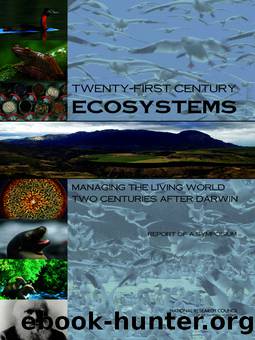Twenty-First Century Ecosystems: Managing the Living World Two Centuries After Darwin by Committee for Biodiversity & Ecosystem Services: A Symposium

Author:Committee for Biodiversity & Ecosystem Services: A Symposium
Language: eng
Format: epub
Tags: ebook, book
Publisher: The National Academies Press
Published: 2014-01-21T00:00:00+00:00
Some of the impediments to integrating scientific advice more closely with policy development are inherent in the scientific culture. Bruce Babbitt enjoined scientists to expand their efforts to explore the policy ramifications of their scientific results. He emphasized that the fear of appearing to be âadvocatesâ if they stray too far from the specifics of their results in their policy discussions can be overdone and can be counterproductive to expanding the influence of scientific research. A related issue, identified by James P. Collins, is that devoting time and energy to the policy applications of scientific work does not necessarily result in professional advancement. In some instances, he said, scientists may even be penalized if such work detracts from their other professional efforts or if it is taken on too early in their careers, before their position is fully secure. Dr. Collins proposed that funders and administrators, as well as tenure and promotion committees, develop new approaches and systems of rewards to encourage more policy interaction and team-driven, as well as individual-driven, research. Andrew Revkin further suggested that every scientist should be thinking of ways to make his or her research understandable by the public. All three speakers emphasized the need to foster a community of science-policy professionals who are respected within the scientific community and who can also serve as conduits for effective scientific advice to policy makers.
One avenue for developing such a community, the American Association for the Advancement of Science (AAAS) Congressional Fellowships Program, has injected hundreds of scientists into the policy process, and the alumni of those fellowships are found throughout the government and in science policy support positions, from the halls of Congress to senior agency staff, to the National Academy of Sciences, to NGOs. The importance of the program, which has been in existence since the 1970s, is coming into clearer focus as the science and technology elements of critical issues facing the nation and the world have grown in complexity and importance. Many symposium attendees noted with regret that the AAAS Science and Technology Policy Fellowship Program has no fellows who are sponsored by societies in the fields of ecology and organismal biology.
Incorporating science into environmental decision making within developing countries presents a particular and significant challenge, as numerous speakers pointed out, because much of the planetâs biodiversity is located in the worldâs least developed nations. CONABIO (Box 2-1) offers a valuable model, and Mary Glackin cited the âcritical need for capacity building for marine biodiversity protection in developing countries.â Unfortunately, the capacity of many national governments both to monitor environmental change and to take domestic measures that serve both the national and the global public good (e.g., control of infectious diseases, sanitary and phytosanitary measures, greenhouse gas mitigation) is currently limited. Continuing and intensifying efforts to build capacity in developing countries will generate benefits not just to the citizens of those countries but to developed countries as well.
Download
This site does not store any files on its server. We only index and link to content provided by other sites. Please contact the content providers to delete copyright contents if any and email us, we'll remove relevant links or contents immediately.
Sapiens: A Brief History of Humankind by Yuval Noah Harari(14369)
The Tidewater Tales by John Barth(12652)
Mastermind: How to Think Like Sherlock Holmes by Maria Konnikova(7323)
Do No Harm Stories of Life, Death and Brain Surgery by Henry Marsh(6938)
The Thirst by Nesbo Jo(6932)
Why We Sleep: Unlocking the Power of Sleep and Dreams by Matthew Walker(6706)
Life 3.0: Being Human in the Age of Artificial Intelligence by Tegmark Max(5549)
Sapiens by Yuval Noah Harari(5366)
The Body: A Guide for Occupants by Bill Bryson(5082)
The Longevity Diet by Valter Longo(5058)
The Rules Do Not Apply by Ariel Levy(4957)
The Immortal Life of Henrietta Lacks by Rebecca Skloot(4579)
Animal Frequency by Melissa Alvarez(4462)
Why We Sleep by Matthew Walker(4434)
The Hacking of the American Mind by Robert H. Lustig(4375)
Yoga Anatomy by Kaminoff Leslie(4358)
All Creatures Great and Small by James Herriot(4311)
Double Down (Diary of a Wimpy Kid Book 11) by Jeff Kinney(4261)
Embedded Programming with Modern C++ Cookbook by Igor Viarheichyk(4173)
